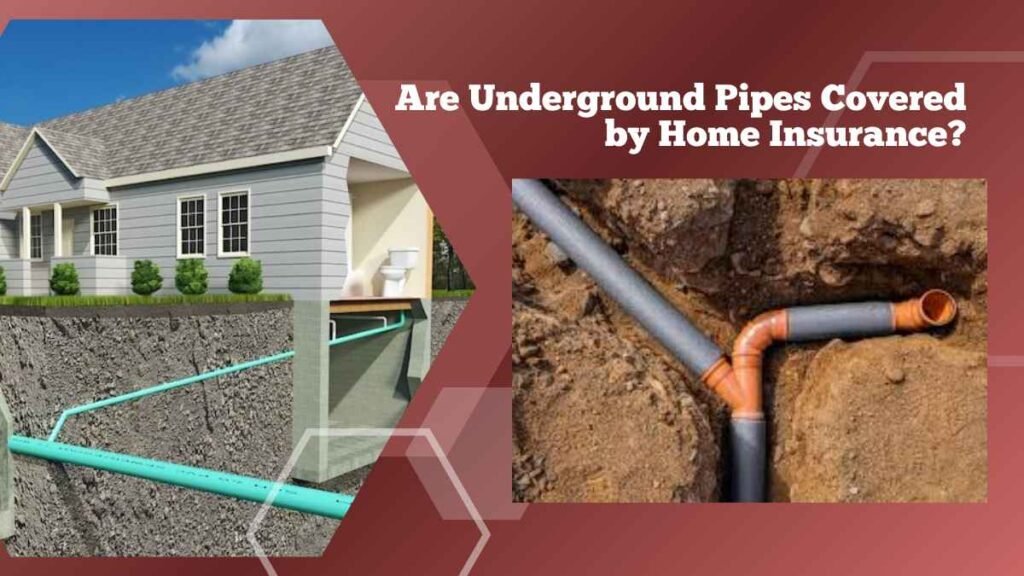Usually, Underground Pipes are Covered by Home Insurance. Sometimes home insurance covers underground pipes. Although this is accurate, most traditional insurance only covers abrupt and accidental subterranean pipe damage. Still, these general rules include clauses and guidelines about your other demands. Usually, homeowners insurance will not cover the expenses of repairing a plumbing pipeline.
The unsung heroes of a house’s infrastructure are underground pipes, which silently guarantee the seamless flow of basic utilities such as water supply, sewage disposal, and appropriate drainage. Still, until an issue surfaces, these vital elements are often invisible and out of memory. The lifeblood of a property is its water supply lines, sewage pipes, and drainage systems, which let homeowners effectively remove wastewater and enjoy clean water for everyday requirements.
Underground pipelines are crucial, but they also come under several hazards that could damage their performance. Potential problems might arise from corrosion brought on by aging materials, invading tree roots invading pipelines, ground shifting brought on by soil movement, and the constant influence of severe weather. Usually resulting in leaks, clogs, or, in extreme circumstances, total pipe collapses, these dangers cause
Repairing or rebuilding subterranean pipelines calls for large resources. Often required are excavation, specialized tools, and trained laborers all of which result in significant expenses. If homeowners lack sufficient insurance, they may find themselves struggling with financial obligations should they discover unanticipated plumbing issues.
Factors that affect coverage for underground pipes
Damage to subsurface pipelines might have many causes. As we investigate it and uncover certain elements. Moreover, we will attempt to assist you in determining the values influencing coverage for buried pipes.
- More coverage is influenced by deeper pipes. It might cause certain occurrences or call for particular tools upon a repair.
- The composition of the elements, their drainage, and stability define the features of the soil. For instance, pipe leaks or corrosion.
- Regarding the surrounding subterranean structures or utilities, their possible contact with other systems under similar risk and cost-bearing burden might boost coverage for insurers.
- Of course, if pipes are kept in good condition, their coverage is unlikely given breakdowns. Alternatively, spurs of events causing harm result in claims.
- It specifies the locations of the subterranean tanks and indicates if extra security is required depending on the increased risk associated with industrial zones, floods, or earthquakes.
How to make an insurance claim if you have a Broken Pipe?
Should there be a pipe problem supplying your home, you first need to ascertain if it is happening on your property line, in which case you should contact your insurance or at street level in which case you should contact the water provider.
Should it be a pipe under your responsibility, your first action should be reporting a concern to your insurance. They can urge you to schedule an appointment for the pipe to be examined and for you to call a trace and access firm from their authorized list. This firm may undertake an inspection and reveal the harm. They will provide their results to your insurer in a report.
Following this, the fundamental reason may be fixed, and, called the “reinstatement” phase, you can seek quotations for projects like flooring, plastering, and decorating. Your insurance may either pay the craftsmen straight or refund you for the expenses after the job is finished.
Remember that frequent cleaning and inspection of your pipes and drains may help you avoid minor problems like a sluggish drain from developing into more serious ones like a total blockage. The state of your subterranean pipes will improve with little adjustments such as drain guards, food waste composting, and bin filling of cooking oil.
Tips for Maintaining And Preventing Damage to Underground Pipes
After outlining elements today, would like to assist you even more with advice. Some great advice for preserving and preventing damage to underground pipelines is here:
- Having them greatly increases the likelihood that any potential indicators of damage or leak would be discovered early. It may assist in preventing a little problem from becoming quite large to serious.
- Using large machinery close to subterranean pipes causes quite significant damage; so, maintaining distance and rooting pipes before digging in any form helps to prevent concealing further damage.
- Plants like trees and bushes should be placed far enough away from buried pipelines. Root infiltration may create pipe clogs and breaks, therefore resulting in regular underground pipe-related problems.
- To be sure their underground pipes are in excellent shape, homeowners have to routinely have them professionally inspected. Professional maintenance services will guarantee that they are fixed or replaced whenever needed, therefore extending the life of your pipework system. Ensuring that your underground pipes are safe and lasting depends much on regular maintenance and preventative actions.
Preventive Maintenance For Underground Pipes
Although insurance may assist in lessening the cost effects of unanticipated damage, homeowners should act proactively to avoid problems with their subterranean pipes. Regular maintenance and inspections assist find any issues early on and avert later expensive fixes.
Here are some preventative actions householders could take:
- By properly insulating exposed pipes, one may assist lower their danger of bursting by helping them to stay free from freezing in cold weather.
- Your pipes may be stressed by too much water pressure, which may cause leaks or breaks. Install a pressure regulator to maintain the waters within a safe range.
- Steer clear of flushing or spilling non-flushable things, grease, oil, or drugs down the drain that could block pipes.
- Look for leaks, breaks, or other damage periodically in your subterranean pipes. Should you find any problems, take quick care to stop further harm.
- Certain insurance companies give unique coverage choices, especially for service lines, which might assist in paying for replacement or repair expenses related to subterranean pipelines. If this coverage meets your budget and needs, think about including it.




